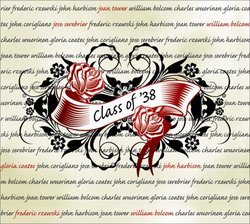A stunning sampler
Dean R. Brierly | Studio City, CA | 08/28/2008
(5 out of 5 stars)
"Naxos has in the past few months released a number of excellent samplers of alternative classical music, all loosely based around a more or less unifying theme. Their latest offering in this vein is this collection of pieces written by eight composers who were born in 1938, which, on the musical evidence here, can be considered something of an annis mirabilis in 20th century music. Despite their shared chronological beginnings, these composers are as different from one another as night is to day. All the selections are, in a word, stunning, including the brilliantly sustained dissonance of Gloria Coates' Symphony #15 (Third Movement), the chilly lyricism of John Harbison's Piano Trio #1, and the mind-bending trance music that is Frederic Rzewski's Winnsboro Cotton Mill Blues. The icing on the cake is a bonus disc of interviews with all of the featured composers save two, in which they talk about their influences and the development of their individual styles. Their informative comments help contextualize the music and provide intriguing insights into the creative process."
Great primer for modern composers
Tym S. | San Francisco, CA USA | 09/06/2008
(4 out of 5 stars)
"The eight composers on this compilation were all born in 1938, and then went in every direction away from each other. This overview is actually a great jumping-in point for learning the range and bold moves of modern experimental classical music.
Gloria Coates' "Symph. 15 III What Are Stars?" has the stately frame of an urban anthem, with simple majesterial horns and tumbling drums, but the strings fidget frequencies like an atonal hive underneath. John Corigliano's "A Black November Turkey" springs out spritely on its way before worrying itself into a tentative uncertainty, then finally jumping back onto the path determined. Jose Serebrier's "Fantasia (For Strings)" is one of his seminal works, a darkly lush rumination that is at times romantic and desperate. Frederic Rzewski's "Four North American Ballads: No. 4 Cotton Mill Blues" rises and falls in modal piano variations that recall a train crossing different landscapes, including deconstructed barrelhouse blues passages. John Harbison's "Trio (1968)" spins dissonant viola, violin, and piano in circles, at times sparring and others wounded. Joan Tower's "Tambor" is rhythmic and declarative, like a reconsidered Copland, before moving into atmospheric interludes over soft vibes and dappling strings, always swooping and evocative. William Bolcom's "Cello Sonata II Adagio Semplice" is a night fever of serpentine piano and cello, sometimes relaxing into bittersweet beauty. Charles Wuorinen's "Josquiniana" builds in serial swells that are akin to a medieval folk melody, courtly and yet pastoral.
There's also a second disc included with intervies of six of the composers to round out the education. A choice primer all around."


 Track Listings (8) - Disc #1
Track Listings (8) - Disc #1